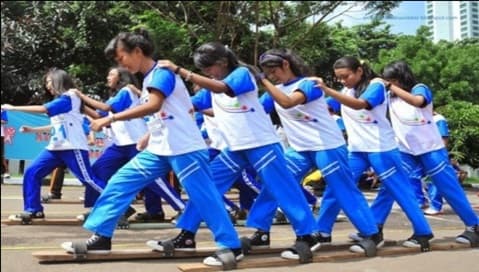Train Early Childhood Cooperation Through Traditional Games
May 9, 2024

The ability of cooperation or teamwork is not only needed at the higher education level or the world of work. Cooperation abilities are also used in people’s daily life. This ability cannot be mastered by someone instantly, it needs continuous practice. The aims is to make cooperation capabilities can be implemented easily in daily life. But actually, children aged 0-8 years are still having their egocentric characters.
This egocentric character will indeed diminish as the child develops. But without a stimulus from the environment, it is not impossible that these characteristics will be carried over to adulthood. A fun and comfortable approach is needed in the process of cultivating cooperation skills, as in traditional games.
Some traditional games that train children’s cooperation in the process of playing are:
- Clogs Game
The cooperation on this game is coordination, cohesiveness, and players ability to listen to the other players opinions. Without a solid teamwork, it is impossible to reach the finish line quickly without a falling players.

- Gobak Sodor Game
Cooperation in Gobak Sodor game doesn’t only hone children’s cohesiveness, but also trains their spirit of leadership, set a strategy for the team and the ability to listen to each other in a team. Even though it looks simple, the game of Gobak Sodor is quite complex in its uses.

- Bentengan Game
On this game, the players are divided into two groups equally. Each group is tasked with determining its fortress and protecting it from opposing players. The fort in this game can be a wall, pillar, tree or even stone. To seize the opponent’s fortress does not require a violence, it is enough to hold onto the opponent’s fortress, it means controlling the opponent’s fortress.

According to some of mentioned games above, the most widely used aspects of cooperation are the division of tasks, communication, interaction and children’s initiative. The aspect of the ability to work together is very useful in children’s daily lives. The benefits of them are:
- Respect for the others.
Children will learn how to listen to the others opinions. On this process, children are unconsciously practices about how to accept collective decisions and not only imposing on what they want. This process indirectly begins to diminish the egocentric characteristics of the child.
- Train self-confidence
In playing the game, every player has the opportunity to express their opinion in strategize. Each children will actively takes a role to achieve the team’s goals. In the process of expressing opinions or playing an active role, they are able to train children’s self-confidence. Children will feel valued and respected.
- Communication
Group games trains children’s peer communication. On this case, communication is not only verbal communication, but also through facial expressions and body movements. Children will also learn how to give a code that only a group members who can understand it. Usually, it is included in an agreed strategy.
Instilling cooperation or teamwork from an early age not only reduces children’s egocentric attitudes, but also trains children to prepare their harmonious future with the others.


